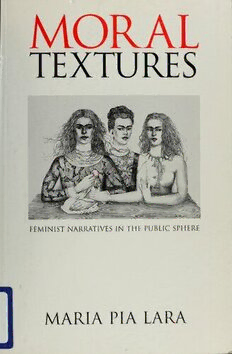Table Of ContentMORAL
TEXTURES
FEMINIST NARRATIVES IN THE PUBLIC SPHERE
MARIA LARA
PIA
BOSTON PUBLIC LIBRARY
„ Copley Square
Boston MA 021 16
Moral Textures
WITHDRAWN
No
longerthe property ofthe
Boston Pubfe
Lfcrary.
Sate ofthis materia! benefited ®s
Library
To Alexander,
Jeff
For all he knows.
Moral Textures
Feminist Narratives in the Public Sphere
Maria Pia Lara
University of California Press
Berkeley Los Angeles London
©Maria Pia Lara 1998
UniversityofCalifornia Press
Berkeleyand LosAngeles,California
UniversityofCalifornia Press,Ltd.
London,England
Allrightsreserved. Exceptforthequotationofshortpassagesforthe
purposesofcriticismand review,nopartofthispublicationmaybe
reproduced,storedina retrievalsystem,ortransmitted,inany formor
byanymeans,electronic,mechanical,photocopying,recordingor
otherwise,withoutthepriorpermissionofthepublisher.
PublishedbyarrangementwithPolityPressinassociationwithBlackwell
PublishersLtd.
ISBN0-520-21776-4(hardcover)
ISBN0-520-21777-2 (paperback)
Typeset in 10on 11 pt Palatini
byAce Filmsetting Ltd, Frome, Somerset
Printed inGreat Britain by TJ International Ltd, Padstow, Cornwall
Thisbook is printed on acid-freepaper.
Contents
Author's Note vi
Acknowledgements vii
Introduction 1
Part I From the Aesthetic totheMoral Sphere 21
1 Autobiographies and Biographies: TheConstruction of
Women's Identity 23
2 Communicative Rationality: BetweenSpheres ofValidity 50
3 Feminismasan ElocutionaryModel 68
4 Autonomyand Authenticityas Textures oftheMoral Subject 81
5 NarrativeCultural Interweavings: Between Facts and Fiction 92
Part II From theMoral to the Political Sphere 105
6 Justiceand Solidarity: Women in the Public Sphere 107
7 The Moral FoundationofRecognition: ACritical Revision
ofThreeModels 120
8 FeministModels ofRecognition: ProblemsofMulticulturalism 146
Conclusion 165
Notes 172
Bibliography 213
IndexofNames 224
IndexofSubjects 227
Author's Note
This book would not have made its way into English without the
patient assistance, hard work and personal involvement of my good
friend and translator, Laura Gorham. Having translated some early
drafts from Spanish into English, she later helped me find ways to
formulate my English drafts into more fluent prose. At the startofthis
project,shewasfundamentalinhelpingmefindfinancialsupportfrom
the FideicomisoMexico/USA. I am deeplygrateful toher.
Acknowledgements
The preparation and completion of this book, as with any creative
work, has incurred profound debts to many persons, from those who
heard the arguments in their initial form, through those who helped
shape and sharpen the viewpoints offered here, to those who read
manydifferentversionsofthemanuscriptandofferedvaluablesugges-
tions abouthowitcouldbeimproved and revised.
Thebookreceivedvital supportfrom the Fideicomiso Mexico/USA,
fundedjointlyby the Rockefeller Foundation and the Bancomer Foun-
dation through the Fondo Nacional Para la Cultura y las Artes in
Mexico (FONCA).Afundestablishedtostrengthenacademicandliter-
ary ties between Mexico and the United States, this institution facili-
tated the translation of the early drafts of my book from Spanish into
English. I am also indebted to my university, Universidad Autonoma
Metropolitana (UAM)-Iztapalapa, not only for its continuing financial
supportthroughouttheyearsbutforthe fellowship thatallowedmeto
spenda yearin Berlin, a trimesterinSwedenand twotrimestersinLos
Angeles. I am especially thankful to Dr Julio Rubio, General Rector of
UAM, Dr Jose Luis Gazquez, Rector ofmy campus at UAM, Gregorio
Vidal,DeanofSocialSciencesand Humanities,andJoseLema,Chairof
my Department of Philosophy. Without their help and support, this
bookwould nothavebeencompleted.
I also wish to record my gratitude to the Institut fur Hermeneutik at
the Freie Universitat, Berlin, and especially to its Director, Professor
Albrecht Wellmer, for allowing me to spend my 1994-5 sabbatical year
in the Institut and to participate in its many fruitful activities through-
out the year. Christoph Menke made possible my initial connection
with the Institut, and Ina Maria Gumbel, its secretary, helped me in
innumerable and generous ways during my year in Berlin. I am also
grateful to ProfessorAxel Honneth forallowingmetoparticipateinhis
viii Acknowledgements
ColloquiumattheSocialScienceInstituteoftheFreieUniversitat. I was
very fortunate to be at the Freie Universitat at such a stimulating
moment.
I wish particularly to acknowledge and thank the friends I made in
Berlin, Marion Rudzki and Hermann Steffens, Maeve Cooke and Mar-
tin Santer, and Begonya Saez and Daniel Saez, all of whom gave me
invaluable support.
Professor Alessandro Ferrara allowed metopresentanearly draftof
one chapter from thisbook to his Multicultural Seminar at the Univer-
sity of La Sapienza in Rome. Bjorn Wittrock, Director of the Swedish
Collegium for Advanced Studies in the Social Sciences (SCASSS) in
Uppsala, also gave me an opportunity to presenta lecture drawn from
thisbook and to share my research with the exciting group offeminist
scholars in residence thereinspring 1996.
I am also grateful to those who have participated in the annual
meetings ofthe Philosophy and Social Sciences group in Prague; these
were initiated by Jurgen Habermas in Dubrovnik and are now held
undertheauspicesoftheInstituteofPhilosophyoftheCzechAcademy
of Sciences. Especially I wish to thank the recent directors of these
meetings,JeanCohen,SeylaBenhabib,SandroFerraraandAxelHonneth,
throughwhomIhavebeenabletoestablishapermanentdialoguewith
many scholarswhohavebecomemycolleagues and friends.
DavidHeldgavemytypescripthisinitialsupport. Histrustthrough-
out the reviewing and revising process was invaluable to me, as were
his open and encouraging suggestions for improvements. I was also
very lucky in the anonymous reviewer chosen by Polity Press. The
clarity and insight of this detailed evaluation not only showed me
possible weaknesses in my arguments but ways to strengthen them,
anditdeepenedmyunderstandingofthewholefieldofcriticalfeminist
studies.IonlyhopethatIhavesufficientlyprofitedfromthisreviewer's
greathelp. I would like to thank RuthThackeray, whose work as copy
editor has been painstaking and Julia Harsant and Sue Leigh at Polity
Press forall theirhelp.
I also wish to thank Joan B. Landes for her constant commentaries,
advice and support as she read various drafts of the chapters of this
book.Herpersonalandintellectualfriendshipmeansagreatdealtome,
firstin Sweden, later in Mexico and Los Angeles.
I am also deeply indebted to Nora Rabotnikof, who gave this manu-
script the last and very important critical reading and offered final
suggestions for revision. Throughout our many years of friendship,
Nora has taught me how emotional and intellectual solidarity can be
deeplyinterrelated.
JeffAlexander, to whom this book is dedicated, also helped edit my
English prose, but, much more importantly, he shared the whole crea-

